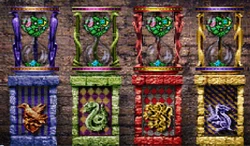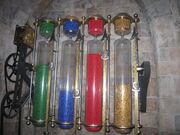
The hourglasses tallying the house points for Ravenclaw, Slytherin, Gryffindor and Hufflepuff.
- "Your triumphs will earn you points, any rule-breaking and you will lose points."
- — Minerva McGonagall[src]
House points are awarded to students at Hogwarts that do good deeds, correctly answer a question in class, or win a Quidditch Match. They can also be taken away for rule-breaking. The points are stored in House point hourglasses that show the point totals at the bottom with stones the main colour of their house (rubies for Gryffindor, sapphires for Ravenclaw, emeralds for Slytherin, and yellow diamonds for Hufflepuff). Each student earns points for his or her House, and at the end of the year, the House with the most points is awarded the House Cup. Teachers, as well as librarians[1] have the power to award or deduct points from students. Prefects, the Head Boy, and the Head Girl can deduct points as well, but not from other Prefects. During the 1995–1996 school year however, members of the newly-formed Inquisitorial Squad were permitted to do so. The squad was stopped after Dolores Umbridge's departure from Hogwarts.
Significant point gains/losses
- In the 1991–1992 school year, Harry Potter, Hermione Granger, and Neville Longbottom get fifty points deducted from each of them for being outside of their common rooms at night. Despite being involved in the same incident, Draco Malfoy is only docked twenty points.[2]
- In the 1991–1992 school year, Ron Weasley and Hermione Granger each won fifty points and Harry Potter won sixty points for their performance in the Philosopher's Stone Chambers from Albus Dumbledore, which tied them with Slytherin for the House Cup. Neville Longbottom won ten points for standing up to his friends, when he tried to stop them from leaving the Gryffindor common room after hours. These ten points broke their tie with Slytherin, so Gryffindor won the House Cup for the first time in over seven years.
- In the 1992-1993 school year, Harry Potter and Ron Weasley were awarded two-hundred points each by Albus Dumbledore for saving the school from the Basilisk, which won the House Cup for Gryffindor for the second year in a row.
- In the 1995–1996 school year, Gryffindor house was quickly stripped of all points following the introduction of the Inquisitorial Squad.
- In the 1995–1996 school year, Harry Potter, Ron Weasley, Ginny Weasley, Hermione Granger, Neville Longbottom, and Luna Lovegood received fifty points each for their participation in the Battle of the Department of Mysteries. Prior to this, the Gryffindor hourglass had been empty.
Behind the scenes

Wizarding World of Harry Potter.
- It is stated that prefects are allowed to dock points from students in Harry Potter and the Chamber of Secrets. However, this idea is diminished in Harry Potter and the Order of the Phoenix when it is stated that prefects are in fact not allowed to do so. In later editions, however, it seems that, with the exception of the Inquisitorial Squad, prefects can dock points only from their own house.
- Exactly how points are tabulated and recorded is not explained in detail. It is implied in several books that simply stating the addition or subtraction of points magically adjusts the score accordingly. It's not certain if this occurs in all cases, such as when Dumbledore adjusts the scores at the end of Harry Potter and the Philosopher's Stone. The four giant hourglasses, however, seemingly adjusts their contents accordingly to the house points granted or retracted by the teachers' wordings.
- In the Harry Potter and the Half-Blood Prince, Severus Snape takes 70 points from Gryffindor before term starts, saying that Gryffindor would have negative 70 points, but in Harry Potter and the Order of the Phoenix, Snape was unable to take points from Gryffindor when they had no points left. It is possible, however, that Snape's next words after "In that case, Potter, we will simply have to..." would have been to send to Gryffindor into negative points, but he was unable to get them out before being interrupted by Professor McGonagall. It can also be assumed he was being sarcastic or joking cruelly about the situation.
- In the films and video games from Harry Potter and the Order of the Phoenix, the house points are earned and counted in the Great Hall to the right of the staff table. However in the first video games, they are also counted in the Great Hall, despite the hourglasses being located in the Entrance Hall.
- In Harry Potter and the Philosopher's Stone, Severus Snape deducts one point from Gryffindor for Harry's statement that Hermione could answer his questions and suggestion that he ask her. This, and the point that he takes for Harry's supposedly setting Neville Longbottom up for failure, are the only instances shown in the books of a single point being deducted for a transgression. They are normally deducted at either 5 or 10 points for small infractions, and multiples of these numbers for greater ones, though in the earliest Harry Potter video game, certain individuals, such as a particular Hufflepuff prefect, deducted them in unusual amounts, such as 6.
Appearances
- Harry Potter and the Philosopher's Stone (First appearance)
- Harry Potter and the Philosopher's Stone (film)
- Harry Potter and the Philosopher's Stone (video game)
- Harry Potter and the Chamber of Secrets (film)
- Harry Potter and the Chamber of Secrets (video game)
- Harry Potter and the Prisoner of Azkaban (film)
- Harry Potter and the Prisoner of Azkaban (video game)
- Harry Potter and the Goblet of Fire (film)
- Harry Potter and the Order of the Phoenix
- Harry Potter and the Order of the Phoenix (film)
- Harry Potter and the Order of the Phoenix (video game)
- Harry Potter and the Half-Blood Prince
- Harry Potter and the Half-Blood Prince (film)
- Harry Potter and the Half-Blood Prince (video game)
- Harry Potter and the Deathly Hallows
- Harry Potter and the Deathly Hallows: Part 2
- Harry Potter and the Deathly Hallows: Part 2 (video game)
- LEGO Harry Potter: Years 1-4
- LEGO Harry Potter: Years 5-7
- The Wizarding World of Harry Potter
- Harry Potter Trading Card Game
- Pottermore
Notes and references
- ↑ Harry Potter and the Philosopher's Stone (video game)
- ↑ Pottermore - From the Story: Harry Potter
